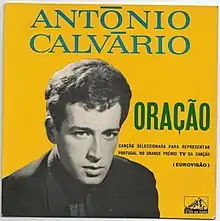Oração
"Oração" ("Prayer") was the Portuguese entry in the Eurovision Song Contest 1964, performed in Portuguese by António Calvário. This was Portugal's debut entry in the contest, and consequently the first time the Portuguese language had been used.
 | |
| Eurovision Song Contest 1964 entry | |
| Country | |
| Artist(s) | |
| Language | |
| Composer(s) | João Nobre |
| Lyricist(s) | Francisco Nicholson, Rogério Bracinha |
| Conductor | Kai Mortensen |
| Finals performance | |
| Final result | 13th |
| Final points | NUL POINTS |
| Entry chronology | |
| "Sol de inverno" (1965) ► | |
The song is in the chanson style, popular in the early years of the Contest, and takes the form of a prayer. Calvário addresses God and confesses to hurting his lover. He goes on to beg for forgiveness, even suggesting that love itself may be a punishment.
The song was performed eleventh on the night, following Monaco's Romuald with "Où sont-elles passées" and preceding Italy's Gigliola Cinquetti with "Non ho l'età". At the close of voting, it had received the dreaded zero points, placing thirteenth (joint last with the Germany, Switzerland and Yugoslavia) in a field of 16.
It was succeeded as Portuguese representative at the 1965 contest by Simone de Oliveira with "Sol de inverno".